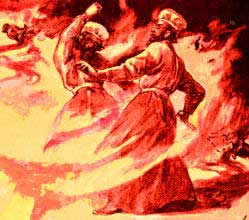
Part 2 – Do we have genuine love among ourselves?
This article discusses love between believers, which is another identifying characteristic often cited by Watchtower publications as evidence that Jehovah’s Witnesses are unique in enjoying an exalted standing as God’s chosen organization.
The other three commonly used lines of reason, which I discuss in other articles, are:
- The perceived wondrous expansion of Jehovah’s Witnesses worldwide
- The claim that Jehovah’s Witnesses are the only ones preaching the good news worldwide (Matt 24:14)
- The claim that Jesus Christ chose the early Bible Students to be his earthly congregation in 1919
If (like me) you are one of Jehovah’s Witnesses, you may feel uncomfortable in examining these topics in any great detail. You have been encouraged to accept any teachings handed down by the Governing Body as absolute truth, even though these are frequently altered and may even contradict what is contained in the Bible. It’s never easy to challenge long-held beliefs, and it can be terrifying to contemplate the possibility that some of what you have learned may be wrong. However, you are to be commended for your bravery in doing so, especially since you are following the Bible’s guidance to “keep testing whether you are in the faith” by examining your beliefs carefully to ensure these correspond with real truth. –2 Cor 13:5, John 4:24.
The love and sense of community that you feel as one of Jehovah’s Witnesses is not only a reason for you to justify the Society’s claims to God’s direction – it is also perhaps something that you personally cherish. However, as with many things in life, there is more than meets the eye. I would encourage you to approach the following information with an open mind, and free from any emotional bias to the extent possible. Once you’ve finished reading, you can ponder over the information, and decide for yourself whether it corresponds with your own knowledge or experiences.
Love Among Yourselves
You are likely very familiar with the following scripture, which is often used in Watchtower publications to support the idea that the Society enjoys God’s backing:
“By this all will know that you are my disciples, if you have love among yourselves.” – John 13:35 (New World Translation)
I won’t deny that generally speaking Jehovah’s Witnesses, wherever they are in the world, think very highly of one another and treat each other extremely well. I used to take great pride in the notion that, if I ever found myself shipwrecked and washed up on a foreign shore, the chances are that I would be able to locate one or several of Jehovah’s Witnesses who would feed me and shelter me.
You are no doubt familiar with agape, which is a word often used in the Society’s publications. Agape is one of the Greek words rendered as “love” in the Greek scriptures, including the words of Jesus quoted above. Agape is used to denote “principled” love, or love that is governed by either positive or negative principles. So, if the love shown between Jesus’ true disciples is principled, we might well ask ourselves – what principle governs the love shown between Jehovah’s Witnesses? Is it a noble principle, or one that is negative in some way?
To illustrate, let’s consider one of Jesus’ parables – that of the “Prodigal Son” (Luke 15:11-32). No doubt you’re familiar with this parable, and you may have read it many times before. This parable reminds us of the intense love between father and son. A son squanders his inheritance by living a life of debauchery, including immoral intercourse with prostitutes. What prompts him to return to his father? The fact that he runs out of food and grows hungry! In fact, he is so hungry that he starts to yearn for the food eaten by the very pigs he looks after. He therefore resolves to return and work as one of this father’s hired laborers, who could at least be guaranteed a meal each day. The Society’s publications often imply that the son’s statement to his father on his return (i.e. “Father, I have sinned against heaven and against you…”) was a sign of his repentance. However, acknowledging that one has sinned does not necessarily make one repentant. By simply recognizing that something is wrong, you are not necessarily saying that you wouldn’t do it again given the opportunity. You are merely admitting wrongdoing.
Let’s imagine for a moment that the prodigal son is real and living today as one of Jehovah’s Witnesses in your congregation, and he is summoned before a judicial committee organized by your local elders. Your elders would be guided by the following instructions in finding out whether or not he is truly repentant…
“The judicial committee should look for clear works of repentance commensurate with his wrongdoing. (2 Cor. 7:10,11) In order to extend mercy, the committee must be convinced that the wrongdoer has a changed heart condition and that he has a zeal to right the wrong and is absolutely determined to avoid it in the future.” (Shepherd the Flock of God, page 91)
The judicial committee would likely look at the factors that prompted the prodigal son to return, namely that he was hungry and wanted to eat the food reserved for this father’s hired laborers. He had also evidently run out of money, so he could no longer enjoy his life of debauchery to the same extent as he had done previously even if he wanted to. Also, he only arrived at his decision to return to his father once he had run out of food and money, and not before. The elders would take all of this into consideration, and reflect on the following guidance:
“Does he demonstrate godly sadness or worldly sadness? (2 Cor. 7:8-11) Is his sadness primarily because of hurting Jehovah and bringing Him into reproach or because of the disappointment he has caused to family and friends and the shame he has experienced?” (Shepherd the Flock of God, page 93)
Yes, the prodigal son’s pre-worded statement to his father acknowledged his sin against “heaven” (or God), but not necessarily regret for it. Moreover, it was undoubtedly so-called worldly sadness that prompted his return, since he was hungry and needed food. Consider the definition of “worldly sadness” in the Society’s literature:
“Worldly sadness mourns the unpleasant consequences of sin, but it does not mourn the sin itself and the reproach it brings on God’s name.” (Insight On The Scriptures, Volume 2, page 773)
There is no mention of the prodigal son “mourning” anything in this parable – apart from his impoverished state as a herder of swine – undoubtedly “the unpleasant consequences of sin”. This prompted his return. He acknowledged his sin against heaven and his father, but tellingly, Jesus didn’t speak of him mourning it with tears or a heartfelt confession, etc. If anything, he was only too ready to get swept along by his father into a celebratory feast! Also, rather than resolving in advance to take the necessary steps to fully restore his relationship with his family, he decided instead to abandon his former position as a son, and request employment as an outsider.

When the parable is carefully analyzed, it’s difficult to paint a picture of a contrite man overcome with guilt without making up elements of the story that simply haven’t been included. Perhaps Jesus omitted these details deliberately, and therein lies the lesson. Perhaps we are meant to take from this parable that the details of any wrongdoing are superfluous when a close family bond, such as the relationship between a father and his son, is at stake. By comparison, in the absense of further information, a modern body of elders guided by current instruction by the Governing Body would have little choice but to disfellowship the prodigal son based on his actions. They would urge his father to shun him, and he would be sent away to get by on his own devices.
If we contrast the way the prodigal son is dealt with in our hypothetical disfellowshipping scenario with the way his father responds to his return in the parable itself, the contrast could not be more striking. According to the scripture, “while he was yet a long way off, his father caught sight of him and was moved with pity, and he ran and fell upon his neck and tenderly kissed him.”
There was no concern in his father’s mind about observing judicial protocol. He didn’t send one of his servants to enquire as to whether his son was repentant before allowing him to venture closer towards the house. All the father could think about was that his son was alive and back with him, safe and sound. Dwelling on any wrongdoing that he had engaged in while he was away could wait until another day. The important thing was that they were reunited as a family. The father therefore put on a feast and celebrated his son’s safe return, much to the chagrin of the prodigal son’s brother, who approached things from a more cold and judicial perspective – refusing to welcome him so enthusiastically.
My point in going over this parable is to highlight how much the Society’s idea of love differs from what real love should be, particularly when it comes to family relationships. No child deserves to be disowned by his or her parents, and no parent should feel compelled to disown his or her child. However, this is exactly what the Society repeatedly advises should happen whenever a teenager who is old enough to leave home is disfellowshipped as a wrongdoer.
Despite the Society’s insistence, nowhere in the bible is disfellowshipping (or “shunning”) recommended between family members. Rather, the practice of shunning is recommended as a measure for keeping the congregation clean, by avoiding association with a person you might otherwise consider sharing a meal with. (1 Cor. 5:11,13) Even so, quite astonishingly, the Society expands the scope of this principle to include family members as well, and goes to great lengths to dissuade parents from having any meaningful contact with any wayward children who may find themselves disfellowshipped by a judicial committee. The Watchtower recently went as far as to suggest that rebellious youths are deserving of being struck down by Jehovah! Consider the following guidance from a recent article, and try to keep Jesus’ parable of the prodigal son in mind when reading:
“Suppose, for example, that the only son of an exemplary Christian couple leaves the truth. Preferring ‘the temporary enjoyment of sin’ to a personal relationship with Jehovah and with his godly parents, the young man is disfellowshipped.” – Heb 11:25 (The Watchtower 2011 7/15 page 31)
The article goes on to claim that shunning is applicable even to such a family member (hanging its reasoning on a clever over-emphasis of the word “anyone” in 1 Cor. 5:11,13) before saying:
“Moses’ brother, Aaron, faced a difficult situation with regard to two of his sons. Think of how he must have felt when his sons Nadab and Abihu offered illegitimate fire to Jehovah and He struck them dead. Of course, that ended any association those men could have had with their parents. But there is more. Jehovah instructed Aaron and his faithful sons: ‘Do not let your heads go ungroomed, and you must not tear your garments [in mourning], that you may not die and that [Jehovah] may not become indignant against all the assembly.’ (Lev. 10:1-6) The message is clear. Our love for Jehovah must be stronger than our love for unfaithful family members.” (The Watchtower 2011 7/15 page 31)
No, the message is not clear! I was astonished and deeply saddened when I read the above words in a magazine that I had learned to respect over the years for its reasonableness. Aaron’s sons, Nadab and Abihu, were serving as official priests on behalf of the nation of Israel when they offered illegitimate fire on behalf of Jehovah, who decided to punish them with death for doing so. To suggest that a youth getting disfellowshipped for wrongdoing is tantamount to adult priests misrepresenting an entire nation in an illegitimate sacrificial ritual is frankly preposterous and deeply inappropriate. It’s a highly flawed analogy on every level.

For one thing, as grown men, Nadab and Abihu cannot be likened to wayward teenagers simply because they happened to be ‘sons of Aaron’ any more than Hitler can be likened to a teenager because he too had a father! Any man can be described as a “son”, but that does not make him a teenager, with all the inexperience and reckless behavior that adolescence brings. The article itself acknowledges that Nadab and Abihu were “men” at the time of the incident. In creating a tenuous link between these full grown errant priests and shunned teenagers, the Society implies that God would be fully justified in striking down any disfellowshipped youths, or at least insists that their parents should treat them as though they have been divinely executed.
The paragraph even goes so far as to highlight the fact that Aaron and his family were instructed not to mourn the execution of their sons, using this to drive home the Society’s message that feelings for delinquent sons or daughters are to be suppressed or abandoned entirely. Parents are to purge themselves of emotion, and become like the fictional Vulcans in Star Trek episodes!
If we were to compare this shocking approach with Jesus’ simple but profound parable of the prodigal son, the difference could not be more strikingly apparent. Jesus highlighted the love between father and son (or daughter), and reminded us that NOTHING should come between this deep bond – not even immorality. In stark contrast, the Society teaches that if a teenage Witness commits immorality for which he is disfellowshipped, then he is to be disowned by his parents and treated as dead or “struck down” by God. Which, to you, sounds like the more loving approach – that of Jesus, or that of the Society? Do you believe that by encouraging the abandonment of thousands of disfellowshipped teenagers the Society gives evidence of love being shown on their part?
Yes, there are standards and principles contained in the bible, and I’m not suggesting that these shouldn’t be upheld by believers. However, the over-riding principle governing all laws in the Bible is that of love, both for God and fellow man. (Matt 22:37-40) Jesus recognized that there are often grey areas when it comes to the precise ways in which laws are applied, and this was a source of much contention with the Jewish religious leaders. The Pharisees were apparently devoid of love, and would observe laws to ludicrous degrees, even to the detriment of human well-being. (Matt 12:9-12) Jesus powerfully rebuked this philosophy when he said: “Go, then, and learn what this means, ‘I want mercy, and not sacrifice.’ For I came to call, not righteous people, but sinners.” (Matt 9:13)
The Governing Body have long had the opportunity to apply the principle of shunning in a more merciful way – a way that would not adversely affect family relationships, which are crucial to one’s mental and emotional well-being. For whatever reason, they have chosen to enforce the less-loving, less-merciful stance of insisting that even family members should shun one another, even though this is specified nowhere in the scriptures. I firmly believe that this decision represents an astounding lack of love on the part of the Society, and its damaging effects continue to reverberate around the world among many disfellowshipped ones who are unfairly starved of any meaningful contact with their families. We do well to ask ourselves, how does this demonstrate the love described by Jesus in John 13:35? What motivates the Society to show “love” in this way? Are their policies motivated by a genuine concern for fallen sheep, or are they purely to raise a firewall that will shield them from criticism by former members?
Christian Neutrality – Unique to Jehovah’s Witnesses?
Having considered the clear lack of love in the way the principle of shunning is enforced by Jehovah’s Witnesses, we do well to scrutinize other aspects of our beliefs. For example, you may be of the opinion that there is evidence of worldwide love between Jehovah’s Witnesses purely by virtue of the fact that as a global brotherhood we refuse to go to war – thus avoiding a potential scenario where one Jehovah’s Witness kills another on the battlefield. You might insist that no other religion has such a strong stance when it comes to “beating swords into ploughshares”, and that this alone constitutes a fulfillment of Jesus’ words. However, would this viewpoint be entirely based on fact?
Charles Taze Russell had close ties with the Second-day Adventist Church when he was first developing his religious views. You may remember a scene in one of the Society’s recent DVDs where Russell is portrayed as attending an Adventist meeting, which re-ignites his interest in the bible – leading to his forming the early Bible Students movement. The Seventh-day Adventist Church is still in existence to this day. In fact, it boasts more baptized members than Jehovah’s Witnesses – over 16 million baptized followers with missionaries in at least 200 countries! And guess what? The members do not believe in going to war with one another. Consider the following statement, found on the Adventists’ official website:
“It is therefore right and proper for Christians to promote peace. The Seventh-day Adventist Church urges every nation to ‘beat its swords into plowshares’ and its ‘spears into pruninghooks’ (Isa. 2:4). The church’s Bible-based Fundamental Belief No. 7 states that men and women were ‘created for the glory of God’ and were ‘called to love Him and one another, and to care for their environment,’ not to destroy or hurt one another. Christ Himself said, ‘Blessed are the peacemakers: for they shall be called the children of God’ (Matt. 5:9)” – Statement on Peace, released by the General Conference president, Neal C. Wilson
This sounds to me like a religion that also believes in abstaining from warfare! The only difference is, Adventists are a much larger religion than Jehovah’s Witnesses, and therefore their anti-war stance is more keenly felt around the world. According to the website Adherents.com, as of May 2007, Adventists represented the twelfth largest religious body in the world. Interestingly, unlike Jehovah’s Witnesses, Second Day Adventists do not promote shunning. As a professed Christian religion, they are far from alone in this regard.
I’m not suggesting that readers of this website should all run off and become Second Day Adventists, far from it. I merely draw attention to this religion as an example of just one faith, much larger than Jehovah’s Witnesses, that does not advocate war. If you were to compare the beliefs of Jehovah’s Witnesses with other religions professing to follow Christianity, you would find far more similarities than you might expect. Included among these similarities is a common tendency for love to be shown between members. When you think about it, this is only to be expected. Any religion will find it in its own interests to actively promote love rather than discord between members, and Jehovah’s Witnesses are just one of many faiths to do so. Unfortunately, as previously discussed, this so-called “love” is tainted by shocking neglect whenever family members leave the faith for whatever reason, which is not a practice supported by scripture – or indeed by all other Christian denominations. When considering the above, can it really be said that Jehovah’s Witnesses are unique in showing love for one another? Is their “love” (or agape) based solely on righteous principles, or is it conditional on sharing commonly held beliefs?
Racial Equality – A Hallmark of Love?
Undeniably, Witness conventions have become excellent showcases for inter-racial harmony. The Society is to be commended for encouraging such harmony and equality among brothers of different races. However, few realize that the Watch Tower Society hasn’t always been at the forefront of urging racial equality in its literature.
If you were to examine the Society’s past writings, you would note that Watchtower publications under both Russell and Rutherford’s presidencies made discriminatory expressions that would cause shock and outrage if they were re-printed today. Such magazine articles hailed the “greater intelligence and aptitude of the Caucasian”, or white man. Black people were described as the product of Noah’s curse on Canaan, and as being a “race of servants”. The book Uncle Tom’s Cabin was slammed as being “the work of Satan” in the Golden Age magazine. Early publications from Russell’s era even insinuated that, when mankind is brought to perfection, God will change the skin of an “Ethiopian” from black to white.
As shocking as the above quotes are, it doesn’t seem practical to reproduce them in their entirety in this article, so I have listed these as comprehensively as possible in another article entitled “A Brief History of Racism in Watchtower Publications”. I would encourage you to take the time to review this information separately and check the quotes if you find my above assertions hard to believe.
Though the subject of racism is awkward and uncomfortable for some, I raise this issue only in an attempt to bring a degree of perspective to our traditional view of the organization as some great vanguard of racial equality in the modern era. Yes, progress has undoubtedly been made since the narrow-minded and bigoted views of a previous generation were allowed to find expression in the Society’s literature. However, we are not talking about just any organization, we are talking about God’s organization, which his son Jesus Christ supposedly chose in 1919! We are therefore fully justified in scrutinizing our organization’s early beginnings and seeing whether or not they could conceivably have been chosen by Christ based on what they were teaching back then. Certainly when it comes to racial equality, the record of the Watch Tower Society is just as tarnished as many other faiths of its longevity.
A Love Based On Great Expectations
You may find it difficult to cope with the notion that Jehovah’s Witnesses are not as unique as you were once led to believe when it comes to showing love. Certainly, the extent to which you receive love from fellow Witnesses very much depends on your individual circumstances, and how much time and energy you are prepared to put forth in pursuit of ‘kingdom interests’. If you are recognized as someone who works hard within your congregation, or you are perhaps a newly interested one attending meetings for the first time, then no doubt you will be showered with expressions of love and kindness whenever you set foot in your local kingdom hall! This is an extremely comforting and reassuring experience – to receive the approval of your colleagues. It’s only natural for we humans to yearn for acceptance, and flourish whenever we receive it.
However, it takes surprisingly little time for this façade of affection to wither and fade. For example, imagine what would happen if you were to stop attending meetings for just a few weeks. I can assure you (having gone through this experience myself) that the text messages would soon stop, the phone would stop ringing, and your email inbox would grow increasingly empty. This is because, as painful as it may be to accept, the love you are shown by the brothers in your local congregation is conditional. This means the brothers will only show you love if you satisfy certain expectations that they have of you, namely to be regular at meetings and in field service. If you were to stop doing those activities, even for a relatively short while, then you would no longer meet the expectations of your fellow brothers, and you would notice a sharp decline in the amount of affection you are shown next time you meet a member of your congregation in the street. This is perhaps something you would need to experience for yourself in order to believe that it is possible for your brothers to drop you so ruthlessly when you consider them to be your friends, but please take my word – this is exactly what would happen.
When we also remind ourselves of our earlier consideration of shunning, and how this is so brutally enforced among Jehovah’s Witnesses (even between family members), we would have to conclude that, on closer examination, the love between members of our faith is nothing more than a highly polished veneer. It only takes a fairly simple series of developments, such as a moment of indiscretion, discovering that it isn’t “the truth” after all, or otherwise ceasing to attend meetings or ministry arrangements, and look! Suddenly the love dries up.
I’m personally confident that Jesus would never have intended such a narrow interpretation of love when he mentioned it as a hallmark of his true followers. However, each one must reach his or her own conclusions based on what they know to be true. Hopefully, even if you don’t agree with my assertions, this article will at least have prompted you to look at the organization as how it truly is rather than what it purports to be.
In my next article I will discuss the idea that the preaching work of Jehovah’s Witnesses sets us apart as God’s chosen people. If this is a subject that interests you personally, then you are warmly invited to consider the information I present.





I can also testify to how conditional love of the Witnesses can be. I am now a member of the Unitarian Universalist Association, where we not only completley reject war, but strive to love one another as a “beloved community,” with membership open to not only all races, but also all sexual orientations and all religions. That’s right: the love that’s shown to me doesn’t care if my religous beliefs are different from other members.
Like you said, Cedars, its not that everyone should run off and join my particular congregation, but its also a reminder that rejecting war and loving other aren’t limited to JWs, and, in many cases, JWs could learn a lot from just how far others are willing to go in trying to live out Christ’s love.
Excellent article and very true.
It’s true that the love is conditional..
I experienced it when I tried to get a JW study with my D’fed sister’s children, with her consent,I even asked an elder for help, and noone was willing to help them, although the children enjoyed going for meetings..It’s as if the punishment is extended to the children. ..the innocent children don’t even have friends in the cong. noone talks to them. ..of course the brothers would say that it’s their Mother who put them in the situation by getting disfellowshipped..
There is no genuine love.
In my culture ,family ties are strong and I know many JWs ,including myself, who do not shun D’fed family members,they’re just careful not to flaunt it.
My crippled friend who can hardly leave her house or look after her two teenage boys gets more help from ‘worldly’ people than from the brothers, even though some of them live in the same complex as her! Yeah, she made a mistake and married an unbeliever, who then beat her senseless and now she’s divorced, in a wheelchair, and trying to raise her kids.
Yes but as Ceda said it is only ONE mark of true christianity. There is other marks that other religions do not meet.
Je regrette de ne pas parler anglais car la traduction automatique n’est pas très bonne. J’apprècie beaucoup ce site. Je retrouve exactement mes analyses personnelles et je me rend compte que beaucoup de frères et soeurs réfléchissent. Cela me réconforte
beaucoup. J’ai connu dans les années 50, 60,70 des frères et soeurs qui se coupaient en quatre pour rendre service. Il y avaient une ambiance d’amour formidable pourtant pas beaucoup d’argent, après la guerre. La façon autoritaire et inhumaine dont l’organisation mène ses troupes depuis les années 80 n’insite pas à amener de nouveaux adeptes. Ce serait leur faire un sale coup.
Merci Cedar.
English Translation (per Google Translate)
I’m sorry I do not speak English as the automatic translation is not very good. I really appreciate this site. I just found my own analysis and I realize that many brothers and sisters think. It comforts me
much. I knew in the 50s, 60,70 brothers and sisters who are cut out to make service. He had a wonderful atmosphere of love yet not a lot of money after the war. The authoritarian and inhumane whose organization conducts its troops from the 80s so not insite to bring new followers. This would give them a dirty trick.
Cedar thank you.
I’m systematically reading through all these blog-posts since early this evening (GMT+2) and find myself ever so often nodding emphatically in agreement as well as wanting to comment every now and then; but just continue reading in amazement.
I just have to pause and thank you for the way you’ve presented the subject matter in this article, Cedars. How wonderful if only the Governing Body will take time to *read* this.
I sincerely hope that many more active as well as ex JW’s will find their way here to jwsurvey.org
How wonderful to be able to share in a *voice of reason* :)
Yes, as one of your other article states it’s only the “beautiful” ones in the congs who get shown any love. At our KH once there was no public talk because all the elders had gone off in their clique to the wedding of one of their sons. So the rest of the cong. had to miss out on spiritual food. And many a time I saw brothers in the street who, when they spied me, turned and walked the other way rather than say hello. My sin? Not getting to all the meetings and being related by law to a paedophile, who incidentally, counted my own children amongst his victims when he was an elder. In fact he wasn’t appointed to that by holy spirit because he was doing this to them when he was appointed. So much for God’s spirit guiding the congregation.
I was baptised in 1986 and was a fully functioning and productive publisher until 2004 when I became seriously ill and was diagnosed with schizophrenia. Shortly after my diagnosis I was visited by two elders who counselled me for sudden poor meeting attendance and implied that my illness was a result of demon activity. In the ten years since I have never criticised the witnesses, either personally or doctrinally, yet in ten years I have had no contact with any member of the organisation. I cannot attend meetings due to my illness, and it seems that your warning is true: because of non productivity I am no longer worthy of their ‘love’. When I became a witness in the early 80s I dropped all of my non witness friends. I refrained from associating with work colleagues and I even distanced myself from my parents and sisters. As a result, when I stopped attending the meetings I had no friends whatsoever. It has taken 10 years to make new friends, including most of my family. My elder sister however is still bitter about my shunning her, but I keep trying to win her back. My new friends’ love is not conditional. They love me despite my shortcomings and I believe am a better person now. I don’t feel it necessary to be so certain about faith. I have learned that an element of doubt is healthy and it leads to tolerance, forgiveness and not This was peace.
Godly love is a wondrous thing. And when received is amazing because it is unconditional. Not to equate love with salvation, even when in sin “God so loved”. I have had first hand account of the conditional love from JW. Shunning is so ingrained that I believe many stay with the JW out of fear of shunning, not because the doctrine is believed. I know personally someone who suffered dissociated amnesia due to the emotional trauma of being shunned by life time friends as well as their children. If this was what is supposed to be done, then I would ask why Peter was never shunned. Love is powerful. To withhold love from anyone is a sin. God told us to love our enemies. Love does not mean acquiesce to their ways but love them despite.
I can vouch for the conditional love shown by fellow members. I recently started doing research after being concerned about the changes in “understanding” around 1914, the generations and the Governing Body. I did several months of in depth study, and as a result came to the decision that I had been mislead for the past 48 years!
I mentioned my concerns to my closest friend, we are both past elders and he had expressed doubts as to the overlapping generations to me. To my surprise he totally turned on me and accused me of being apostate. I offered to show him from only the Bible and WT publications. The result? He refused to look at any “proof” that I had, told us that they would no longer associate with us, despite having been close friends for over 40 years. It is as if we never existed, never spent holidays together etc. I was appalled at the immediate switch from love to hate.
Their love is definitely conditional. When I was a teenager, before anyone of my generation got baptized, I had a lot of friends, I even thought that I could not find anything better. But things started to change as long as everyone was getting baptized, except for me. Now, I’m 19, not baptized, I don’t receive almost any invitation to hang out and only 2 or 3 barely talk to me.
Couldn’t the argument of “Conditional love” that you stop getting messages when you stop attending meetings be defended with “if you have love among yourselves”?
“Yourselves” being the congregation. Since you stopped attending meetings, you’re no longer considered part of it?
I’m trying to look at it objectively.
@John
A fundamental Christian teaching is that you are also supposed to love your neighbor, not just members of your own church. However, if JWs run into former members about town they refuse to even acknowledge them or say hello. Parents and children (as well as other relatives) may go decades without any normal interaction because of a church mandate. To me, that does not sound like the type of neighborly love Christ described.
WS
@John, there are many who do attend meetings who are shunned because maybe we are not from the cool group, or because we have a ‘negative’ attitude due to injustices done and continuing to be done to us by the elders. We get treated just the same as those who have stopped attending. Thus, when we decide to stop attending, the conditions are the same, except maybe now there is a better reason why we are ignored.
Are you unaware of the true situation in our congregations?
John,
Capitol punishment was a clear law in the bible. Committing a serious sin you were put to death.
Gods grace and mercy was exercised in the case of David and in other instances such as Aarron being spared but not his sons for using strange fire.
The prodigal son is clearly one of those cases that allowed Jesus to extend mercy. The only way he could have known he was repented was he could read his heart. You have clearly shown that trying to judge your fellow brother is impossible due to inability to know what is in someone’s heart. There is no book that give you the proper tools to determine is someone is has godly sadness. It is best to let Jesus do the judging. The parable is clear to let the wheat grow with the weeds until Jesus does the harvesting.
John,
Capitol punishment was a clear law in the bible. Committing a serious sin you were put to death.
Gods grace and mercy was exercised in the case of David and in other instances such as Aarron being spared but not his sons for using strange fire.
The prodigal son is clearly one of those cases that allowed Jesus to extend mercy. The only way he could have known he was repented was he could read his heart. You have clearly shown that trying to judge your fellow brother is impossible due to inability to know what is in someone’s heart. There is no book that give you the proper tools to determine is someone is has godly sadness. It is best to let Jesus do the judging. The parable is clear to let the wheat grow with the weeds until Jesus does the harvesting.